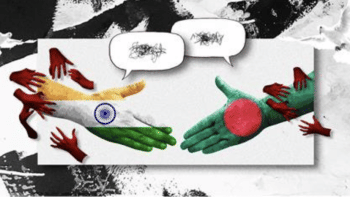Bangladesh-India relations should be based on equity

The relationship between Bangladesh and India has been tense since the ouster of former Prime Minister Sheikh Hasina following the nationwide student-led movement in July-August 2024. Subsequently, anti-Bangladesh propaganda in the Indian media, coupled with Delhi's seeming reluctance to extradite Hasina, fuelled growing anti-India sentiment in Bangladesh. Additionally, the chief adviser of the interim government visited China on his first bilateral visit abroad, breaking the longstanding tradition of visiting India first. This shift also led to reciprocal trade restrictions between India and Bangladesh on crucial trade routes.
India, as a regional giant and emerging global power, bears responsibility to recalibrate its approach to Bangladesh. The relationship has often been marked by asymmetry, characterised by political goodwill but lacking in equity. Dhaka is not just a smaller ally but a genuine partner, deserving of fair treatment that recognises its legitimate interests.
Equity in diplomacy does not equate to equality. It entails fair treatment, recognition of differing capabilities, and the establishment of systems that address power asymmetries rather than exploit them. Stronger nations must shoulder greater responsibilities not to dominate but to facilitate balanced cooperation.
The United Nations Charter upholds the sovereign equality of all its members. Regardless of size or strength, every country, including Bangladesh, deserves an equal voice in regional decisions affecting its people, resources, and security.
Non-intervention in domestic affairs is another fundamental principle of international relations, directly relevant to Bangladesh-India relations. India's perceived involvement in Bangladesh's internal political dynamics has often bred resentment and suspicion, undermining mutual trust.
These principles are not just moral ideals but practical guidelines for sustainable and respectful diplomacy. For Bangladesh-India relations to thrive in the 21st century, both countries must embody these values.
Despite frequent affirmations of friendship, Bangladesh often finds itself on the receiving end of disproportionate behaviour. The sharing of the Teesta River serves as a glaring example. Despite over a decade of negotiations, India's domestic political considerations, especially opposition from West Bengal, have repeatedly stalled the Teesta River sharing agreement. Meanwhile, farmers in Bangladesh's northern regions suffer from water shortages. The solution demands equitable negotiation and sensitivity to the environmental and human costs on both sides of the border, rather than dominance.
Similarly, border killings by Indian security forces remain a tragic and unresolved issue. Although both governments claim to be working to reduce such incidents, they continue to occur regularly, often involving unarmed civilians. Such actions not only violate bilateral agreements but also undermine the spirit of peaceful coexistence enshrined in international law. India must increase efforts to hold its forces accountable and address Bangladesh's concerns seriously.
Bangladesh maintains a significant trade deficit with India. While India exports over $11 billion worth of goods annually to Bangladesh, its imports from Bangladesh remain below $2 billion. This imbalance is shaped not just by market dynamics but also by non-tariff barriers, bureaucratic hurdles, and restrictive Indian trade policies. Equity demands that India provide preferential market access and remove trade barriers hindering Bangladesh's export growth. Only then can the bilateral relationship mature into a true partnership.
There have been positive developments in connectivity between the two nations, including the revival of rail and road links, the utilisation of ports, and growing energy cooperation. Bangladesh has accommodated Indian requests for transit and access to its territory. However, regional connectivity must be reciprocal, viewing Bangladesh's strategic location not merely as a corridor to India's northeast but as a sovereign asset to be respected and fairly negotiated.
India's aspiration to lead South Asia as a regional power must be grounded in consensus-building rather than unilateralism. Legitimate leadership requires generosity, fairness, and the capacity to uplift neighbours rather than dominate them.
Bangladesh and India possess significant potential for cooperation, ranging from climate change and disaster response to trade, counterterrorism, and cultural exchange. To unlock this potential, both countries must move beyond the old paradigm of dominance and dependency. India should regard Bangladesh not as a subordinate but as an equal stakeholder in South Asia's future.
Bangladesh, meanwhile, should assert its national interests confidently yet diplomatically, leveraging its growing geopolitical significance. Multilateral forums, particularly SAARC and BIMSTEC, should serve as platforms for reinforcing norms of equity, with active engagement from both nations to rejuvenate these institutions.
Sadia Aktar Korobi is a graduate from the Department of Peace and Conflict Studies at the University of Dhaka.
Views expressed in this article are the author's own.
Follow The Daily Star Opinion on Facebook for the latest opinions, commentaries, and analyses by experts and professionals. To contribute your article or letter to The Daily Star Opinion, see our guidelines for submission.

 For all latest news, follow The Daily Star's Google News channel.
For all latest news, follow The Daily Star's Google News channel. 










Comments